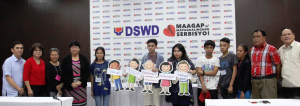 To cap off the two-day consultation workshop on the enhancement of programs and services for children families and indigenous peoples (IPs) at-risk on the streets, Department of Social Welfare and Development (DSWD) Secretary Judy M. Taguiwalo (fourth from left) showcased the priority areas that the national and local government, non-government organizations (NGOs) and civil society organizations (CSOs) must take into consideration to address the needs of street children during last Tuesday’s media conference at the Asian Institute of Management (AIM) Conference Center, Makati City.
To cap off the two-day consultation workshop on the enhancement of programs and services for children families and indigenous peoples (IPs) at-risk on the streets, Department of Social Welfare and Development (DSWD) Secretary Judy M. Taguiwalo (fourth from left) showcased the priority areas that the national and local government, non-government organizations (NGOs) and civil society organizations (CSOs) must take into consideration to address the needs of street children during last Tuesday’s media conference at the Asian Institute of Management (AIM) Conference Center, Makati City.
These are housing, education, health, love and protection, family and community support, and livelihood.
The Secretary was joined by (from left to right) DSWD-National Capital Region (NCR) Director Vincent Andrew Leyson, DSWD-Social Technology Bureau (STB) Director Thelsa Biolena, Assistant Secretary for the Office of the Secretary Group (OSG) Aleli Bawagan, Sama-Bajau community organizers, partner-beneficiaries, Quezon City Social Services Development Department (SSDD) Youth Welfare Coordinator Nonie Metran, and DSWD-Social Marketing Service (SMS) Director Cezario Joel Espejo.
In the press conference, Sec. Taguiwalo emphasized the need to ensure the regular monitoring of children at-risks on the streets and the importance of maintaining strong coordination with different agencies. She also highlighted the need to push for significant economic programs and reforms that will help poor families.
“We need to intensify our collaboration with LGUs, NGOs, CSOS, and partner-beneficiaries to efficiently and effectively deliver the programs and services needed by street dwellers. We need to push for meaningful and sustainable economic reforms for the poor that can empower them and help them to become productive citizens,” the Secretary emphasized.
The consultation workshop was held last December 19 and 20, 2016 and was attended by representatives from various local government units (LGUs) in Metro Manila, CSOs, NGOs, partner-beneficiaries, and officials and staff of the DSWD Central Office and Field Offices in Regions III, CALABARZON and NCR. ###


